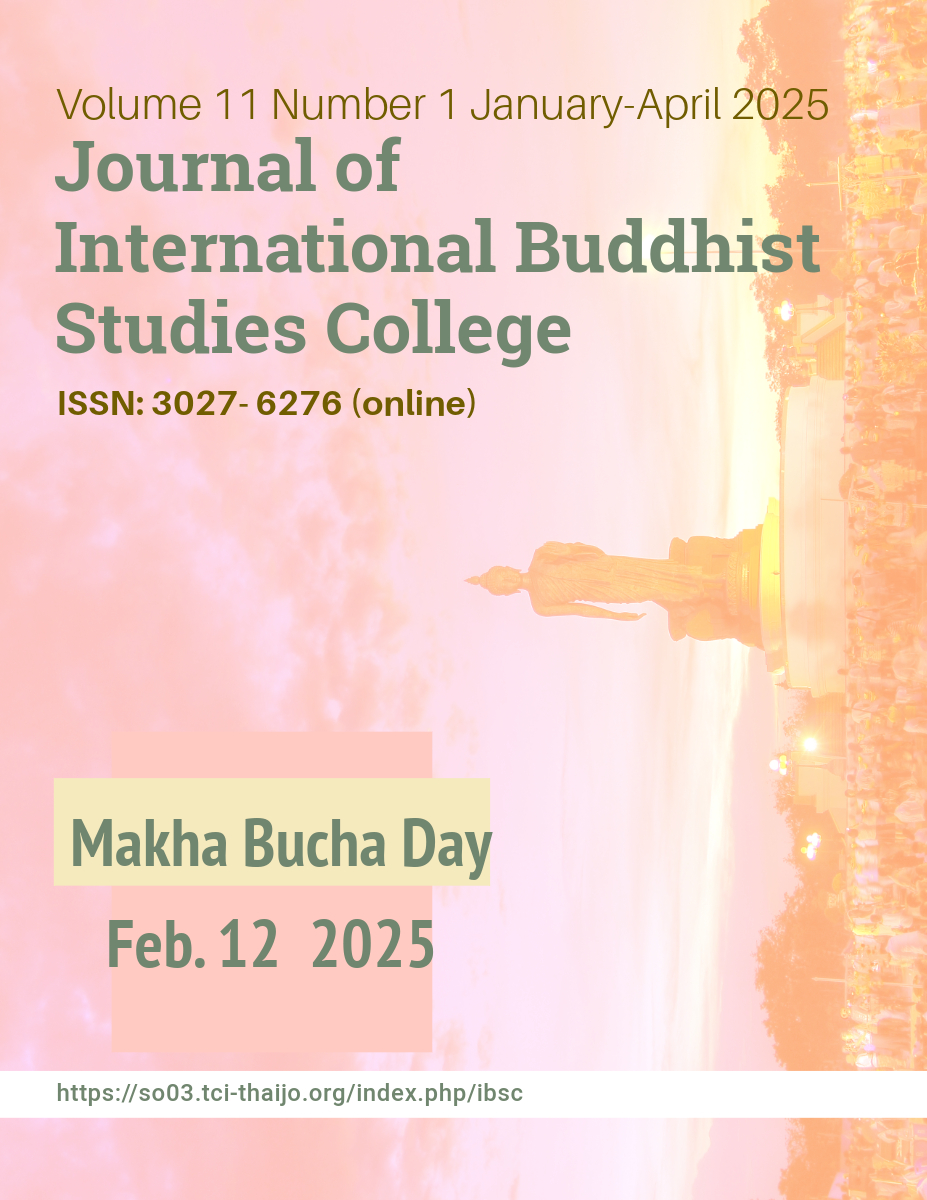The Buddhist Ways to Develop Human Values as Depicted in the Theravāda Buddhist Scriptures
Main Article Content
Abstract
This paper examines the Buddhist methods for cultivating human values as depicted in the Theravāda Buddhist scriptures. Human values, which guide individuals in distinguishing right from wrong, are essential for personal growth and societal harmony. Unlike moral values, which are universal and unchanging, human values vary across individuals and contexts, influencing behaviors that contribute to the betterment of human life. Theravāda Buddhism emphasizes the development of human values through four key practices: Faith (Saddhā), Offering (Dāna), Morality (Sīla), and Meditation (Bhāvanā). These practices foster ethical living, harmonious social interactions, and spiritual growth, ultimately leading to a meaningful and valuable life. Faith serves as the foundation for spiritual practice, enabling individuals to trust in the Buddha’s teachings and persevere through challenges. Offering, or generosity, cultivates kindness and detachment from material possessions, while morality provides a framework for ethical conduct through the observance of the Five Precepts. Meditation, on the other hand, develops mindfulness, concentration, and insight, helping individuals overcome mental defilements such as greed, hatred, and delusion. This paper explores how these Buddhist principles can be applied to modern society to promote human development and well-being. By integrating these practices into daily life, individuals can achieve greater inner peace, social harmony, and spiritual fulfillment. The teachings of the Buddha offer timeless wisdom for navigating the complexities of contemporary life, providing a path toward personal and collective transformation. Through an analysis of key Buddhist texts and their practical applications, this paper highlights the relevance of Theravāda Buddhism in addressing the challenges of the modern world and fostering a more compassionate and ethical society.
Article Details
The Journal of TCI is licensed under a Creative Commons Attribution-NonCommercial-NoDerivatives 4.0 International (CC BY-NC-ND 4.0) licence unless otherwise stated. Please read our Policies page for more information on Open Access, copyright and permissions.
References
Bhikkhu Bodhi. (Trs.) (2012). The Numerical Discourses of the Buddha: A Translation of the Aṅguttara Nikāya. Wisdom Publications.
Chakraborty, P. (2014). The Law of Kamma and Salvation. International Journal of Humanities & Social Science Studies (IJHSSS). 1(3), 193.
Chandradasa, J. (2023). Moral and Ethical Values in Buddhism. Dailymirror, 1 (10), 3-16.
Cho, F. (2014). Buddhist mind and matter. Religions, 5(2), 422-434. https:// doi.org/10.3390/rel5020422
Ven. K. Sri Dhammananda. (2002). What Buddhists believe. Buddhist Missionary Society.
Ven. K. Sri Dhammananda. (2005). A Happy Married Life: A Buddhist Perspective. Retrieved December 20, 2024, from https://www.accessto insight.org/lib/ authors/dhammananda/marriage.ht
Dissanayake, W. (2006). The Idea of Verbal Communication in Early Buddhism. University of Kelaniya.
Fronsdal, G. (2024). The Practice of Generosity. Insight Meditation Center Journal. 1(1), 5-10.
Fundamentals of Buddhism. (n.d.). Mental Development. Retrieved December 20, 2024, from https://www.buddhanet.net/fundbud7/
Fuyu. (2023). Buddhist principles for living a life to the fullest. Zen Buddhism Temples Journal, 1(5), 1-17.
Giustarini, G. (2006). Faith and renunciation in early Buddhism: Saddhā and nekkhamma. Rivista di Studi Sudasiatici, 1(1), 161-179.
Gold, J. C. (2015). Paving the great way: Vasubandhu’s unifying Buddhist philosophy. Columbia University Press.
Kiriwandeniya, P. A. (2018). Buddhism: A Way of Life and Promoter of Social Welfare. The Journal of International Association of Buddhist Universities (JIABU), 11(3), 334-339.
Nataraju, A., Unyo, P. S., & Damnoen, P. S. (2017). Philosophy of Creating Peace in Buddhism. Mahachula Academic Journal, 4(2), 185-195.
Payutto, P. A. (1994). Buddhist economics: A middle way for the market place. Buddhadhamma Foundation
PhraBrahmagunabhorn (P. A. Payutto). (1998). A Constitution for Living Buddhist principles for a fruitful and harmonious life. B. Evans, Trs.). Buddhist Publication Society.
Premasiri, P. D. (2020). The Concept of Sīla in Theravada Buddhist Ethics. Journal of Humanities and Social Sciences. 3(1), 1-15.
Rahula, W. (1997). The Noble Eightfold Path. Grove Press.
Salzberg, S. (2003). Faith: Trusting your own deepest experience. Penguin.
Singh, A. K. (2012). Economic management: An interpretation from the Buddhist perspective. Sri Lanka International Journal of Buddhist Studies (SIJBS), 2, 74-87.
Tangney, J. P., Stuewig, J., & Mashek, D. J. (2007). Moral emotions and moral behavior. Annual Review of Psychology, 58 (1), 345-372. https://doi.org/ 10.1146/ annurev.psych.56.091103.070145
Vasava. (2019). The Four Conditions for Wealth and Happiness in this Life. Review of Research, 8 (1), 1.
Ven. Mokesh Barua. (2019). The Value of Moral Practice in Buddhism. Mahachulalongkornrajavidyalaya University.
Visuddha & Balachandran, P. (2014). The Principles of Marriage in Theravada Buddhism. Golden Research Thoughts. 3 (11),


